News & Events in Belarus
CSTO summit in Minsk, casual talks, appointment of ambassadors, election dates in President’s Week
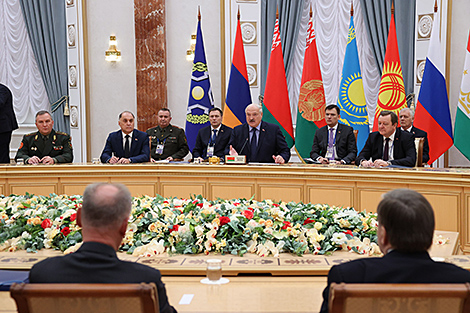
The work schedule of the Belarus president is always full of events. Aleksandr Lukashenko holds conferences and working meetings on the most topical matters concerning the country’s development, regularly visits the regions, goes on foreign trips and welcomes foreign guests, talks to reporters, signs decrees and laws. And even if there are no public events, it does not mean that the head of state does not work. It must be said that even when he relaxes, for instance, by playing ice hockey or chopping firewood, Aleksandr Lukashenko happens to find the time to give yet another instruction. All the decisions must be prompted by life, he likes to say.
The President’s Week project is intended for those, who want to keep up with the head of state, be up-to-date on the latest statements and decisions of the Belarusian leader.
What was the situation in the Collective Security Treaty Organization in the year of Belarus’ presidency? What matters were discussed at the Minsk summit? What did Aleksandr Lukashenko urge the partners to do?
What is Belarus ready for in cooperation with Tajikistan? What did Aleksandr Lukashenko talk about with the president of Kyrgyzstan behind closed doors? How did he talk to Vladimir Putin in an Aurus car on the way to the airport?
The appointment of diplomats, the tasks the head of state wants the new ambassadors to achieve. All of that and more than that in the new episode of BelTA’s special project President’s Week.
COLLECTIVE SECURITY. How did a CSTO summit take place in Minsk? Who did Aleksandr Lukashenko talk to the day before?
A session of the Collective Security Council of the Collective Security Treaty Organization took place in Minsk on 23 November. It was the main official event of the year of Belarus’ presidency over the organization under the motto “Through solidarity and cooperation towards peace and security”.
Such events are supposed to summarize accomplishments to a large degree. The general conclusion reads that despite the ever complicated geopolitical situation Belarus has successfully accomplished its tasks. “Belarus’ presidency is evaluated positively. The heads of state spoke highly of it. Minsk showed a very active stance and the organization has managed to accomplish a great deal this year. And the year has been complicated,” CSTO Secretary General Imangali Tasmagambetov told mass media.
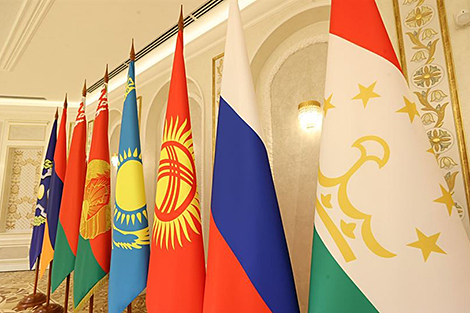
The heads of state summarized results of not only what had been done collectively but what had been done separately, on a bilateral basis. During the summit Aleksandr Lukashenko said: “In bilateral relations, trilateral relations, and other kinds of relations we prioritized military and political matters due to today’s situation, due to the evolving situation in our responsibility area. This is why, undoubtedly, as we looked into matters of economy (it is the basis, the foundation of any military and political situation), we talked about matters, which are related to our work in the Collective Security Treaty Organization.”
“Our work in the Collective Security Treaty Organization did not start and did not end here, in Minsk. We discuss a huge spectrum of problems during the year. As we met today, we evaluated and summed up results of this year,” the president stressed.
It is commonly known that Prime Minister of Armenia Nikol Pashinyan was absent during the CSTO summit. He had decided against going to Minsk due a number of reasons. The decision was made public even during the week before. However, the decision will not affect the legitimacy of the summit’s decisions, Belarusian Minister of Foreign Affairs Sergei Aleinik told reporters. Decisions are made by consensus in the Collective Security Treaty Organization. The parties had agreed before the summit that after the summit all the documents would be forwarded to Armenia for approval.
“Not a single decision has been blocked. The Ministry of Foreign Affairs of Belarus and the Ministry of Foreign Affairs of Armenia have agreed on all the decisions [documents submitted to the summit attended by the heads of state], on the declaration. This is a testimony to mutual understanding, including on the part of Armenia, in addressing issues within the scope of responsibility of the organization,” State Secretary of the Security Council of Belarus Aleksandr Volfovich said.
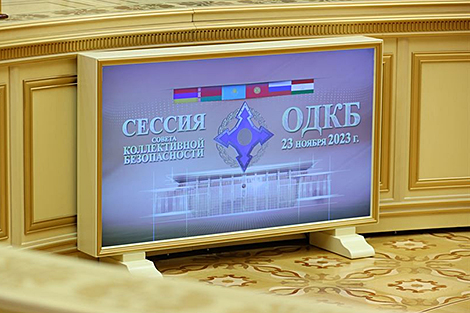
During the plenary session of the summit Aleksandr Lukashenko remarked that the parties had also discussed the situation in Caucasus and some dissatisfaction of a member of the Collective Security Council. “We've concluded that problems have always been and will be. If we are to resolve them, we should do it at the negotiating table instead of staging escapades without a cause,” he said.
Meetings with the CSTO secretary general and with military
A number of events on the presidential schedule were dedicated to preparations for the summit and for hosting the visiting dignitaries. On Monday, 20 November Aleksandr Lukashenko met with Secretary General of the Collective Security Treaty Organization Imangali Tasmagambetov.
Various details were discussed on the eve of the summit, but at the same time Aleksandr Lukashenko made an important foreign policy statement that describes the processes going on in the organization’s responsibility area. The president spoke in positive terms about the solutions that had been found in a recent border conflict between Tajikistan and Kyrgyzstan and about the end of the standoff between Armenia and Azerbaijan. “We need to think about the future - how the two states are going to live there,” the Belarusian leader emphasized.
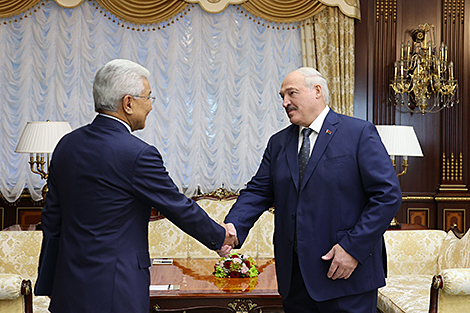
“It is understandable that in both cases the problems had been accumulating for many years. These are long-standing points of tension. Yet, we have seen something positive happening in this regard. This is not because we presided [over the CSTO in between sessions]. But it was during this period that some progress was achieved and the situation started calming down in the post-Soviet space,” Aleksandr Lukashenko said.
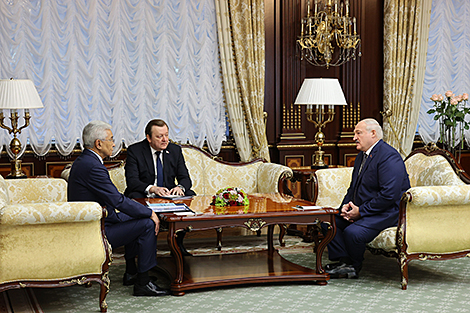
The next day, 21 November Aleksandr Lukashenko met with defense, security, and law enforcement officials in order to discuss military and political matters. State Secretary of the Security Council of Belarus Aleksandr Volfovich, Chairman of the State Security Committee of Belarus Ivan Tertel, Defense Minister Viktor Khrenin, and Chief of the Central Intelligence Office, Deputy Chief of the General Staff of the Armed Forces Vladimir Kupriyanyuk were invited to report to the head of state.
“I would like to consult on a number of military and political matters, and primarily on defense and security matters, and hear about the problematic matters that we may have today in our relations with the CSTO members,” the president said at the beginning of the meeting. No other details about the meeting were reported. It is understandable because these matters often need to be discussed out of the public eye.
Negotiations without ties
Foreign heads of state started arriving in Minsk on 22 November. Aircraft carrying the presidents of Tajikistan and Kyrgyzstan landed at the Minsk National Airport in the afternoon.
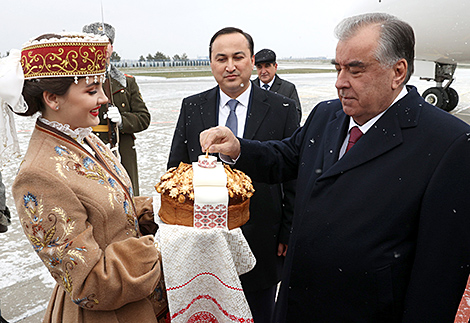
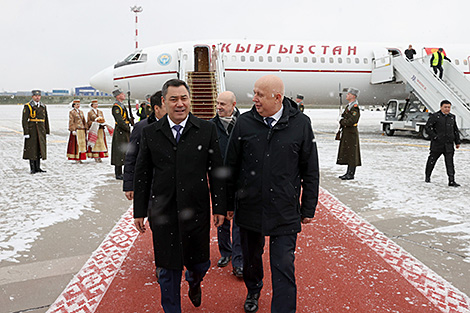
Aleksandr Lukashenko met for casual talks with the presidents one by one in the Palace of Independence.
“We welcome you as a friend. You are very close to the Belarusian nation. You are very well known. You are respected for your openness, simplicity, warm-heartedness just like the entire Tajik nation is,” the Belarusian leader told Tajikistan President Emomali Rahmon.
The Belarusian head of state mentioned the development of the Tajik economy despite the complicated situation around the country. Commenting on the bilateral relations, he mentioned rather good trade turnover and this year’s increase in it. “Our trade turnover will be close to $100 million. But I want you to understand that we are ready to buy any amount of your products. Particularly agricultural ones, which unfortunately we don’t have. This is why Tajikistan has contacted us with a request to set up a powerful trade center here. You have to know that we will do everything to set up the center. We’ve offered three locations in Minsk to your initiators. If you don’t like them, we can find more. We are ready to work on it together with you,” Aleksandr Lukashenko said.
“All your products that you make – aluminum, cotton, and the rest – will enjoy a very serious demand here if you can deliver them to us. In other words, our economy, politics, and humanitarian affairs develop rather well. We also work quite well in military technology cooperation. We are ready to increase trade turnover to the extent the friendly country of Tajikistan needs,” the Belarus president added.
At the beginning of the meeting the Tajikistan president thanked the Belarusian head of state for the invitation and for the warm welcome. “I’d like to mention Belarus’ successful presidency over the Collective Security Treaty Organization,” he said. “We are very grateful to you for your efforts in the course of the presidency over this organization. We have accomplished a great deal together.”
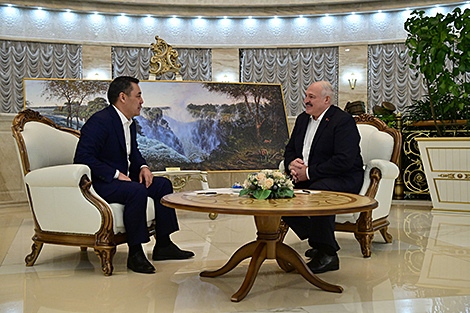
Aleksandr Lukashenko also met with Kyrgyzstan President Sadyr Japarov in an informal setting. The conversation proceeded behind closed doors, but it is reported that the presidents discussed the forthcoming CSTO summit as well as several aspects of development of the bilateral relations.
Highlights of Aleksandr Lukashenko’s statements during the summit
A restricted-attendance session of the CSTO Collective Security Council chaired by Aleksandr Lukashenko took place first. It was followed by an expanded-participation session in the form of a plenary session. Aleksandr Lukashenko stressed that the Collective Security Treaty Organization remains an integral part of the efforts to ensure the security of the CSTO member states and the Eurasian region as a whole.
During the restricted-attendance session the presidents discussed topical problems of international and regional security, summed up results of the CSTO’s work in between sessions, and heard out a report from the CSTO secretary general. All the members of the CSTO Collective Security Council noted that the current international situation has a high degree of confrontation and polarization and necessitates further consolidation of efforts, the enhancement of the Collective Security Treaty Organization.
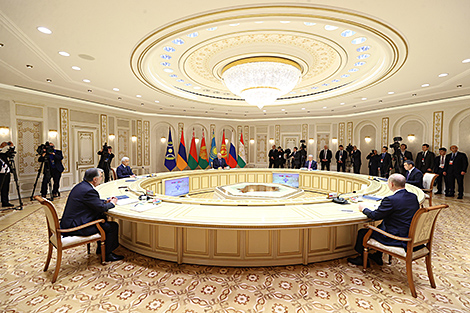
Aleksandr Lukashenko spoke at length about the key problems that affect everyone and are closely interrelated with each other:
- “Whirlwind of the change of epochs” – a gradual transition to multipolarity is in progress. But the West does not want to give up its positions and is trying to dominate the entire world. “All the known dirty tricks are put to use starting with sanctions, blackmail and ending with the fomenting of interethnic conflicts,” the head of state noted. Purposeful work to spin up the spiral of a new arms race is in progress against the backdrop of obnoxious and belligerent rhetoric of individual politicians and the complete loss of mutual trust.
- Ukraine is being pumped full of weapons, which spill over to black markets, the Middle East conflict, double standards of the West… All of them are instability factors. But the Belarus president drew attention to the key thing: “More concerning is the premonition of a global catastrophe, a new world war that may stem from the regional conflict. A lot is often being said about it. Overseas forces are just waiting for countries close to the CSTO area of responsibility to be drawn into this war. This so-called controlled chaos, muddy waters is what the United States and the West want.”
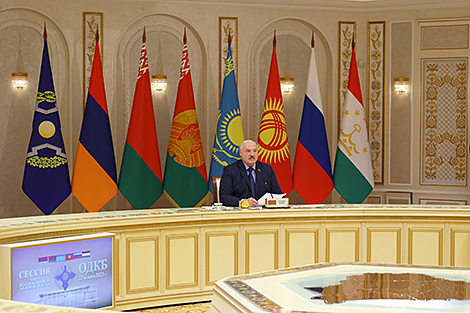
- A number of NATO countries, including Belarus’ neighbors, are getting aggressively armed. NATO itself is expanding. It organizes military exercises and practices various scenarios, including nuclear strikes. Millions of dollars are spent on preparations for failed coups. “Against this backdrop complaints about the deployment of Russian tactical nuclear weapons in our country, on our territory are simply absurd. I repeat for the 100th time that we don’t threaten anyone. We simply learn so-called diplomatic etiquette from those, who have made the language of force a world trend. Nowadays only the presence of powerful weapons guarantees security in the region and gives the right to speak in the international arena,” Aleksandr Lukashenko stressed.
- Once again the head of state called the partners to unite and to resolve all the issues together: “When some of our partners say and do provocative things, it is primarily their problem. I will say one thing: if you are not okay with something, say it right in each other’s face instead of taking your grievances to mass media. This is why we gather for such meetings in order to discuss all the pressing issues and find solutions.”
Decisions made at the CSTO summit
A total of 15 documents were submitted for signing during the CSTO summit in Minsk. The CSTO Collective Security Council signed a declaration, which is designed to emphasize fundamental principles of the organization’s operation. The document expresses the organization’s stance on topical international security problems.
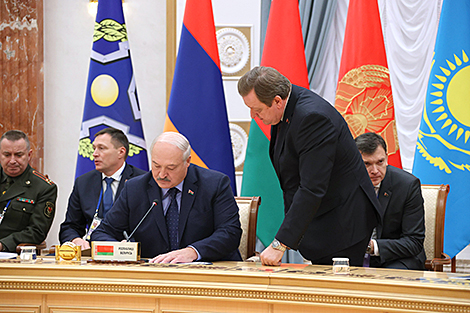
A decision on measures to develop the Collective Security Treaty Organization’s crisis response system was made. A new revision was adopted of the regulation on the procedure for making and implementing collective decisions on using forces and assets of the CSTO collective security system.
The CSTO Collective Security Council also approved a regulation on the joint press center of the Collective Security Treaty Organization.
Decisions on a number of personnel matters were signed. Colonel-General Andrei Serdyukov of Russia was appointed Chief of the CSTO Joint Staff. A decision was made on distributing quota-based jobs in the organization for the next three-year period.
The structure of the CSTO Joint Staff has been adjusted for the sake of improving the performance of working bodies of the organization as they deal with current tasks and new ones.
The heads of state also discussed matters concerning the enhancement and development of military cooperation of the Collective Security Treaty Organization and the organization’s budget.
They decided that presidency over the Collective Security Treaty Organization will pass from Belarus to Kazakhstan as from 1 January 2024. During the expanded-participation session of the CSTO Collective Security Council the Kazakhstan president presented information about Kazakhstan’s priorities during the presidency. The next session of the CSTO Collective Security Council will take place in Astana, Kazakhstan in Q4 2024.
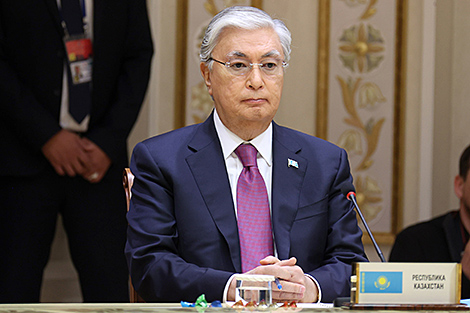
The next meeting of the heads of state is expected to take place in St. Petersburg in December. President of Russia Vladimir Putin invited his counterparts to attend a session of the Supreme Eurasian Economic Council and an informal summit of the Commonwealth of Independent States there. There is hope that an Armenian delegation will take place in these events as well.
Meeting with Vladimir Putin
Aleksandr Lukashenko talked to Vladimir Putin one-on-one on the sidelines of the CSTO summit.
At first the two presidents discussed the common and up-to-date agenda at the Palace of Independence. Later on they continued talking business in a car. By the way, the leaders chose a Russian Aurus car for the joint trip. Aleksandr Lukashenko accompanied his Russian counterpart to the airport.
Press Secretary of the Russian President Dmitry Peskov told reporters later that the heads of state had a substantial conversation on the way to the airport.
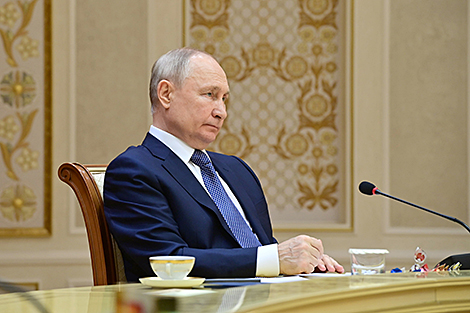
ADDITIONS TO DIPLOMATIC CORPS. What did the president tell the new ambassadors?
On 20 November Aleksandr Lukashenko made personnel decisions and appointed ambassadors to China, Zimbabwe, South Africa, and Indonesia.
Aleksandr Chervyakov, who had been Economy Minister, was appointed Ambassador Extraordinary and Plenipotentiary of the Republic of Belarus to the People’s Republic of China.
Igor Marshalov, who had previously held the position of Deputy Chairman of the State Control Committee and Director of the Financial Investigations Department, was appointed Ambassador Extraordinary and Plenipotentiary of the Republic of Belarus to the Republic of Zimbabwe.
Igor Bely was appointed Ambassador Extraordinary and Plenipotentiary of the Republic of Belarus to the Republic of South Africa with concurrent accreditation to the Republic of Botswana, the Republic of Mozambique, and the Republic of Namibia. Before that he had served as Head of the Main Directorate for Asia, Africa and Latin America of the Ministry of Foreign Affairs.
Sergei Malinovsky, who had headed the Main Directorate for Information and Analytics of the Ministry of Foreign Affairs, was moved to take over the position of Ambassador Extraordinary and Plenipotentiary of the Republic of Belarus to the Republic of Serbia with concurrent accreditation to the Republic of North Macedonia.

Roman Romanovsky was appointed Ambassador Extraordinary and Plenipotentiary of the Republic of Belarus to the Republic of Indonesia with concurrent accreditation to Malaysia, the Republic of Singapore, and the Republic of the Philippines. Before that, he had worked as Deputy Head of the Main Directorate - Head of the Pan-European Cooperation Department of the Main Directorate for Europe and North America of the Ministry of Foreign Affairs.
The president also agreed to the appointment of Aleksandr Matsukov as Consul General of the Republic of Belarus in Mumbai, India. Previously he had worked as the head of the Citizenship and Foreign Travel Department of the Main Consular Directorate of the Ministry of Foreign Affairs.
Cooperation with China and Zimbabwe
Although all the personnel decisions made on 20 November were diplomatic appointments, Aleksandr Lukashenko invited the new ambassadors to China and Zimbabwe for a separate conversation.
“I have specifically invited you for a separate meeting in order to talk about your appointments. I want to emphasize that these two countries are extremely important,” the Belarusian leader told Aleksandr Chervyakov and Igor Marshalov.
The head of state noted that Belarus and China have already established cooperation across key areas, contacts have been made, therefore the new ambassador will not have to work from scratch.
“I won’t say that in Zimbabwe we are building our relations from scratch. I visited the country last year. Naturally, I am not the only one who has contributed to it. Everything that was done before the visit and after the visit indicates that there is still a lot to do. However, we have already helped [Zimbabwe] harvest enough grain to feed its people. But there is still a lot of work ahead,” the Belarusian leader noted. “We need to establish diplomatic presence, expand our foothold in this country. After all, they are looking forward to seeing us there. They appreciate us, we have proven that we are reliable people. And they want us to bring our technologies in mechanical engineering and other industries - construction, healthcare, education (personnel training is very important), and agriculture - to Zimbabwe,” the president noted.

“The neighbors [of Zimbabwe] especially Mozambique, expressed their strong intention to cooperate with us when they learned about our plans in Africa,” the head of state added.
Speaking about China, Aleksandr Lukashenko emphasized that this country along with Russia is among Belarus’ key partners: “They help us both technologically and financially.” The head of state believes that Aleksandr Chervyakov’s experience will enable him to advance relations with China to a higher level.
“Therefore, there will be a lot of work,” the head of state remarked.
Efficiency criteria for diplomats
When making decisions on the appointment of the ambassadors to South Africa, Serbia, and Indonesia, the head of state asked people in charge why these candidates had been selected for these positions from a large cohort of applicants, what had been so remarkable about them.
“All the presented candidates have significant experience of diplomatic work. More than 20 years,” Minister of Foreign Affairs Sergei Aleinik explained. “All of them have the necessary competences, skills and experience of working in foreign diplomatic missions. They have proven themselves as competent specialists and patriots. I am sure that they will decently represent our republic in the countries, accreditation in which is supposed to be approved today, and will defend our interests in these countries, by promoting first of all the economic agenda, which is a priority for us today.”

“I would like them to understand that we will evaluate their work based primarily on trade and economic cooperation with these countries,” the president noted.
Prospects of cooperation with Africa’s south
Speaking about cooperation with Mozambique, Aleksandr Lukashenko emphasized that it should develop in sync with cooperation with the neighboring Zimbabwe where Belarus is already known well and where interaction between the countries is already smooth. Moreover, Zimbabwean President Emmerson Mnangagwa discussed this topic with his counterpart from Mozambique. “There will be an ambassador there, just like in Zimbabwe. I would like you to maintain contacts. Figuratively speaking, while establishing presence in Mozambique, we need to piggyback on our cooperation with Zimbabwe. They are very interested in us. Our technologies, especially in the agricultural industry, can stand them in good stead,” Aleksandr Lukashenko said.

There are quite a lot of problems in Africa’s south and Belarus can help address them, as was the case with Zimbabwe. “Zimbabwe is glad to have been able to finally feed its people. They couldn’t harvest grain crops. But now they are harvesting them two or three times a year. They have met their people’s needs for this staple food. Why can’t we help Mozambique? We can. Therefore, we need to figure out the situation there and focus on the country that needs our help the most. Naturally, this is not charity,” the Belarusian leader said.
Future of relations with Serbia and beyond
The president urged to seriously review Belarus’ cooperation with Serbia and the work of the Belarusian diplomatic mission in this country. “We need to wrap our heads around the policy that Serbia is pursuing and plans to pursue in relation to Belarus. If they want [to cooperate with Belarus], then we should see results of this cooperation in the trade and economic dimension. If they want to wag the tail, to put it bluntly, and support European and American sanctions against Belarus, this is their business. They should make up their mind and support [the sanctions] if they have forgotten our kindness towards them,” the head of state said.
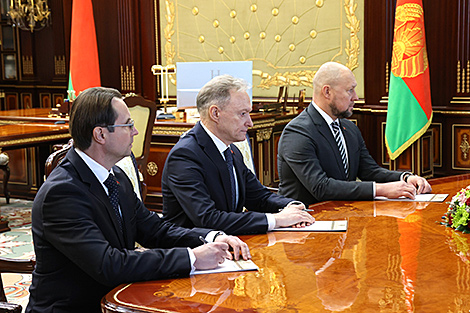
Aleksandr Lukashenko encouraged the diplomats to strengthen contacts with those countries that also strive for constructive cooperation and that are ready to accommodate Belarus. “We are about to face another problem, which I have just mentioned. If the West and America do not want to cooperate with us, fine then, we will retain our diplomatic presence where it is needed. And we should transfer most of the diplomats to those areas where we see progress. We have achieved progress in cooperation with many countries, we cooperate with a lot of nations. We need to build up momentum,” he stressed. This statement equally applies to Serbia. “You just need to figure out what they want in the political dimension. It is not okay that they say one thing but do another. Therefore, we need to figure out things,” said the Belarusian leader.
Southeast Asia
The president described cooperation with Southeast Asia countries in the following manner: “Apart from some occasional trade and economic contacts, we have hardly got our foot in the door. We need to gain a foothold there. Indonesia, Malaysia, and Singapore are promising destinations, and we should come up with one and a half, two or three projects in each of them. This is your task.”
Tighter cooperation with India
According to the president, Belarus’ Consulate General in Mumbai should work in sync with the embassy. “You definitely need to team up. You should not divide our presence their into the embassy and consular units. If we need to strengthen our presence, we should definitely do it. We should establish closer cooperation with India, primarily in economy and trade. This is a huge global power. We should identify our interests there,” the president said.
START OF ELECTION CAMPAIGN. What major decrees did the head of state sign?
On 20 November Aleksandr Lukashenko signed decrees No.367 “On setting the date for the elections of deputies” and No.368 “On setting the date for the elections to the Council of the Republic of the National Assembly of the Republic of Belarus”.
In accordance with the Constitution, these documents call elections to the House of Representatives of the National Assembly of the eighth convocation and local councils of deputies of the 29th convocation on the single voting day - 25 February 2024, and to the Council of the Republic of the National Assembly of the eighth convocation - on 4 April 2024.
Candidates for seats on the Council of the Republic shall be nominated by local councils of deputies, executive and administrative bodies no later than 21 March 2024.
At the same time, the Central Election Commission, government agencies, and other organizations shall take measures to organize elections, while the central government shall allocate funds for their preparation and conduct from the national budget.
On 20 November Aleksandr Lukashenko also signed decree No.357 “On the Council for Strategic Projects”. This council under the president of Belarus has been set up in order to improve the planning, development and implementation of strategic projects, introduction of results of scientific activity into production. The National Academy of Sciences of Belarus will be responsible for the Council’s activities. It will be headed by Chairman of the Presidium of the National Academy of Sciences Vladimir Gusakov.
The main tasks of the council are to coordinate the search and selection of promising strategic projects, as well as their support; to analyze the relevance, political and economic feasibility, competitiveness of the proposed and implemented strategic projects; to develop proposals for improving the implementation of strategic projects.
PLANNING AND ORGANIZATION. What did Aleksandr Lukashenko discuss with the head of the presidential administration?
On 21 November Aleksandr Lukashenko heard out a report from Head of the Belarus President Administration Igor Sergeyenko. At the beginning of the meeting Aleksandr Lukashenko outlined a set of talking points. The president noted that matters of organizational nature will be central.
Those include the planning of the presidential schedule (mandatory events); preparations for the upcoming elections of deputies as well as the election of delegates to the Belarusian People’s Congress; preparations for the New Year and Christmas holidays.
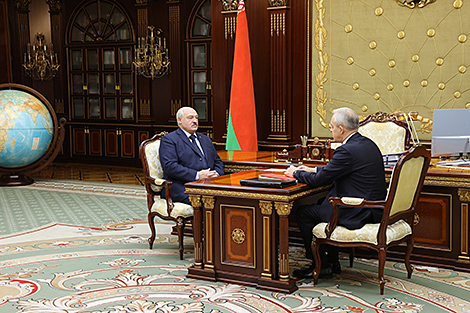
Igor Sergeyenko told reporters after the meeting: “I have briefed the head of state on the work of the Belarus President Administration to organize a number of events. This primarily concerned the events that are due to take place this year, as well as socio-political issues and personnel matters. Plans for 2024 were also discussed, including the president’s schedule and key events for next year.”
In his words, personnel training and work with the personnel reserve at all levels were discussed. First of all, this pertains to the work with officials in the talent pool of the head of state. The youth policy and the work to identify the most capable and talented candidates to work in government agencies and other state-run organizations and institutions were also on the agenda.
Igor Sergeyenko noted that the head of state’s schedule is quite busy. It is obvious from the weekly itinerary of Aleksandr Lukashenko.
The year 2024 will also be quite tense, the head of the Belarus President Administration is convinced. He recalled that the day before Aleksandr Lukashenko had signed decrees to call parliamentary elections. Thus, the Central Election Commission will start preparing for the electoral campaign on the ground as well. It is noteworthy that delegates to the Belarusian People’s Congress will be selected next year in line with a new procedure to ensure that people’s interests are duly represented. The Belarusian People’s Congress will feature people from all walks of life, including parliamentarians and representatives of civil society.
“The range of tasks is quite big. One of them is taking stock of economic performance in the current year. This will also be the subject of discussion with the president. Several large-scale meetings, which the president mentioned earlier, are to be held to review specific areas of social and economic policy. Therefore, everyone will have to work hard,” Igor Sergeyenko concluded.


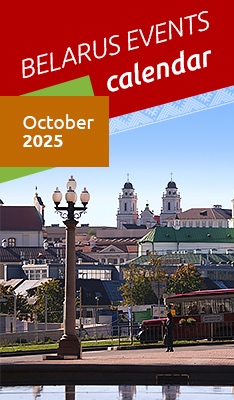




 print version
print version make home page
make home page add to bookmarks
add to bookmarks

